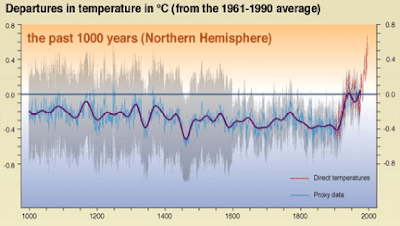A DeSmog detractor has created two new webpages which are the most flattering and fallacious of anything I’ve seen in ages.
First, our intrepid critic has created a list of “Climate Fascists” in which he included my name with the likes of Al Gore, Arnie Schwarzenegger, Jim Hansen, James Lovelock, Michael Mann, Nicholas Stern and Tim Flannery. (I’m so proud, I have taken a screenshot to show my kids.)
Second, he has posed a list of 10 questions that he imagines we “climate fascists” cannot address.
The DeSmogBlog does not boast the academic horsepower for a serious debate about climate science (for that, you should try realclimate.org ). We’re here to identify obvious public relations efforts to confuse the issue. But just because our critic has been so nice, here are the questions with a set of responses in italics.
1. When did the debate end? We have been told for some years now that the “debate is over”. When did this happen? Who determined it? If the “debate is over” then why are serious scientists arguing against CO2 as the cause of climate change? Are they ALL in the pocket of Big Oil?
I presume this is mostly rhetorical, but certainly the Intergovernmental Panel on Climate Change has said there is a 90+ per cent certainty that human activity is leading to problematic climate change. As to the “serious scientists” arguing against it: we can think of Dick Lindzen, but that short list doesn’t justify the use of a plural.
2. How is the science settled? Leaving aside the arguments about the cause of global warming, if “the science is settled” then why are the predictions from the IPCC‘s First Assessment Report different to the Second Assessment report different to the Third Assessment Report and different to the Fourth Assessment Report?
Isn’t that the whole point of DOING a second, third and fourth assessment: that you would update your work?
3. How do you explain this? The following graph plots temperature anomaly against CO2 Concentration and Sunspot Cycle Length. How do you explain the remarkable correlation with sunspots and why do you believe that CO2 is the main determinant of climate change?
Per this paper , the above graph is both out of date and factually inaccurate. Sunspot activity since the mid-’80s has actually been declining while temperature has continued to spike.
4. What the heck has happened to the Hockey stick? The IPCC Third Assessment Report introduced the world to the iconic Hockey Stick graph, which was used to underpin the arguments that 1) man made CO2 was the main factor in climate change since the start of the Industrial Revolution; and 2) the consequences of not addressing CO2 would be a huge rise in temperature of up to 5.8 degrees Celsius? Given all of the hype surrounding the Hockey Stick and the vigorous defence of its accuracy in spite of undeniable evidence of its statistical impossibility, why is it not prominent in the recently released Fourth Assessment Report?
Had you actually READ the most recent IPCC report, you would have found the hockey stick on Page 3. How much more prominent can it be? (IDIOT ALERT: PER ONE OF THE COMMENTS BELOW, WHEN WRITING THIS RESPONSE, I REACHED FOR THE WRONG IPCC REPORT. THE MOST RECENT IS ACTUALLY HERE AND THE DENIERS‘ BELOVED HOCKEY STICK IS MUCH LESS IN EVIDENCE. RL)
5. Why believe climate models? Climate models have an appalling predictive record and could only model 20th century climate by applying more modifications than a Swiss Army Knife has gadgets, an exercise in back-fitting that would cause any first year statistician to throw their hands up in disgust. Climate models don’t factor in the effect of the sun, which seems a bit of an oversight given the graph above, or the greatest greenhouse gas, water vapour. Given that the two most major determinants of climate are missing from the models why do you believe their predictions?
This seems rhetorical again.Per the above-mentioned IPCC summary, the models are getting more accurate by the day – even if first-year statisticians find them vaguely complex. The question here is why people who say they want to study science also refuse to use the most up-to-date equipment to do so. Arguing climate change without computer models would be like arguing distance without a measuring tape or – imagine the riskiness of it all? – an odometer.
6. Why is symbolism more important than effectiveness? The Kyoto Protocol has been shown by both sides of the debate to be an initiative that would make no discernible difference to our climate (around 0.1 degrees Celsius by 2050) and cost trillions of dollars. Those in favour of it claim that it is a ‘symbolic first step’ while the other side rejects its lack of effectiveness. Australia is leading the world in the development of clean coal technologies that, when exported to China and India, will make more difference than ten Kyoto Protocols. Why is symbolism more important than effectiveness?
The question casts this as an either/or issue, which it clearly is not. Bravo to those Australians who are legitimately engaged in trying to clean up coal. That’s an absolute necessity given current energy technology and demand. But why should it preclude a responsible effort to reduce greenhouse gas emissions by other methods while we wait for the techies to catch up? It’s true that Kyoto is hopelessly inadequate; but how can that be taken as a legitimate reason to do – say – nothing as an alternative.
7. Why the IPCC censorship? The IPCC reports are the result of a large number of scientists providing input with each section being overseen by a lead author. Many scientists have claimed that their work was ignored because it disagreed with the basic tenets being promoted by the IPCC. If the “science is settled” then why does the IPCC have to actively censor contributing scientists?
I’d be interested to see a scrap of evidence to prove this claim ….
8. Why are all the predictions of only doom and gloom? From inundation of our coastal cities to increasing drought, famine and pestilence on a Biblical scale why are all of the predictions about a rise in temperature always bad when it’s clear that life on earth has historically thrived when the climate has been warmer than today?
Okay, I’m all in favour of growing wine grapes in Liverpool, and I spent 20 years on the Canadian prairies HATING winter. But a quick cost/benefit analysis (cue Nicholas Stern ) if we don’t
act, the overall costs and risks of climate change will be equivalent to losing at least
5% of global GDP each year, now and forever.” That’s why.
9. What caused the Medieval Warm Period and Little Ice Age? The MWP (~850-1250) was a period of higher than average temperatures. It is no coincidence that life on the planet thrived at this time. Greenland and Iceland were settled, the Arctic sea ice retreated and they even grew wine grapes in England. The LIA (~1350-1850) was a period of especially cold temperatures and it is no coincidence that life on earth had a particularly difficult time. In the winter of 1780, New Yorkers could walk from Manhattan to Staten Island across a frozen New York Harbour. In England the river Thames froze over giving the opportunity for people to hold ice fairs. In the Netherlands rivers and canals also froze over allowing skating and frost fairs to be held. Al Gore’s documentary clearly shows that there’s a relationship between temperature and CO2 with the implication that the latter causes the former. If CO2 is the main determinant of climate then where did it come from to cause the MWP and where did it go to cause the LIA?
Oh, let’s not talk about anthropogenic climate change. Let’s talk about historical anomalies that have already been explained and factored into current scientific analysis a thousand times. CO2 is the main determinant of current warming. The physics of it are undeniable: more CO2, more warming. Lot’s more CO2, lots more warming. The fact that humans have interfered in a way unprecedented in history does not mean that climate has not varied naturally in the past or that it will not also do so in the future. It only means that, right now, we have sullied our environment in a dangerous way. Given the lack of alternative environments in easy driving distance, it would, perhaps, be prudent to stop, no?
10. Why the hooey about sinking islands? It strikes me as suspicious that all of the so-called evidence for rising seas comes from places so out of the way that the average person has no way of verifying the claims. Such is the case with Tuvalu which, it is claimed, is the canary in the global warming coal mine. However, to geologists the whole notion is absurd. Tuvalu sits on the crest of two tectonic plates and has been rising and falling throughout its history. After selling their .tv Internet domain name for $40 million the small population has clearly worked out that they can scam more money from rich nations by jumping on the global warming bandwagon. In PNG it’s the Takuu Islands and in India it’s the Sunderbans. All are affected by tectonic activity. Why the hooey about sinking islands?
Islands go up, islands go down. Island dwellers get used to the risks. Sea level goes up and down, too, but when humans realize they are doing something to promote sea level rise – and that risk-tolerant island dwellers are suddenly at much greater risk as a result, well isn’t that an appropriate time to say, “Hooey!” in the hopes of attracting some intelligent attention? Isn’t it?
Subscribe to our newsletter
Stay up to date with DeSmog news and alerts









